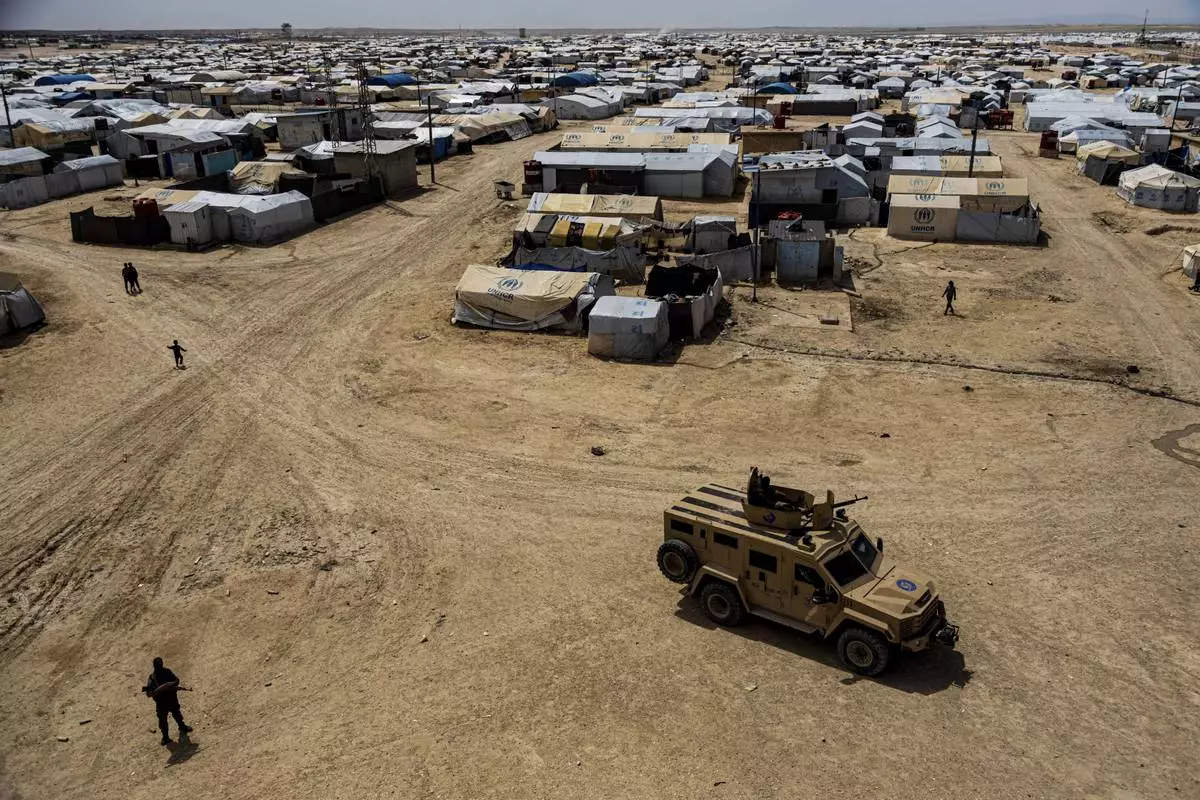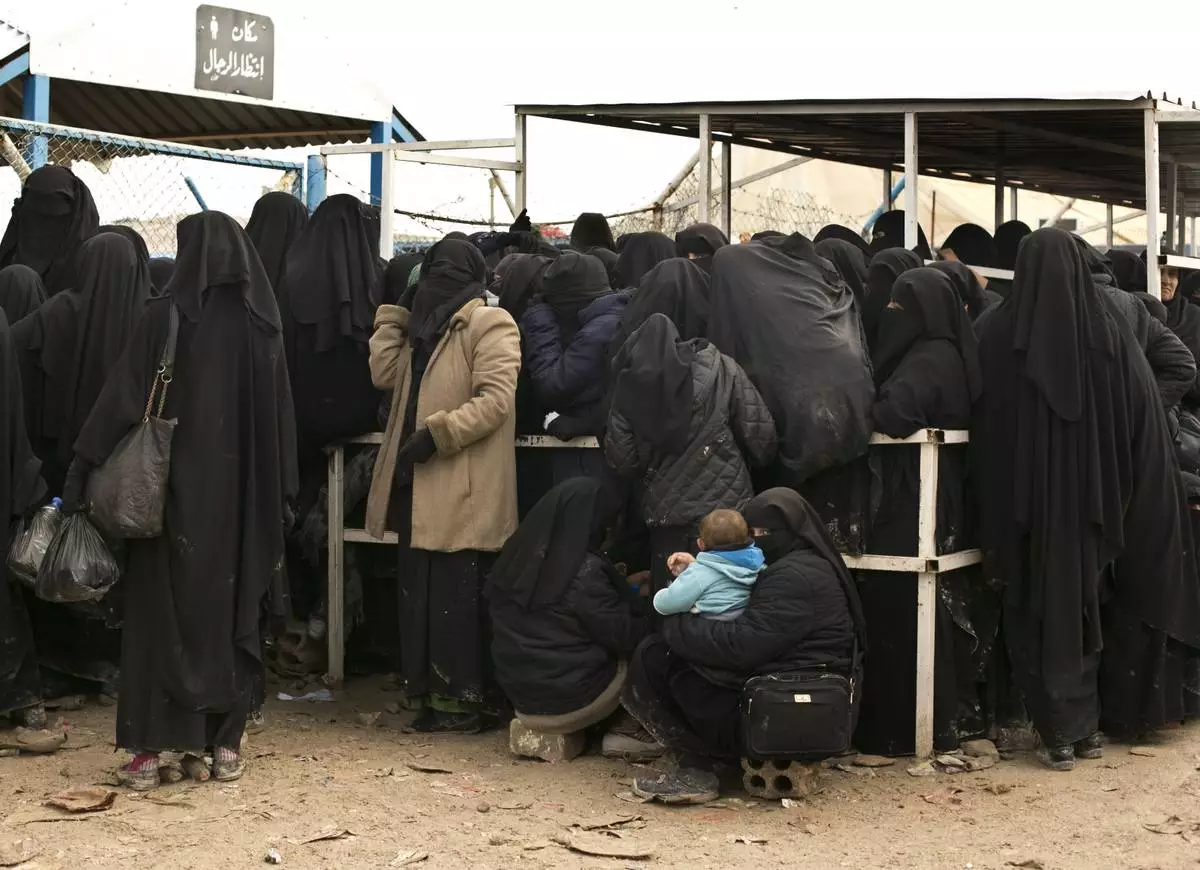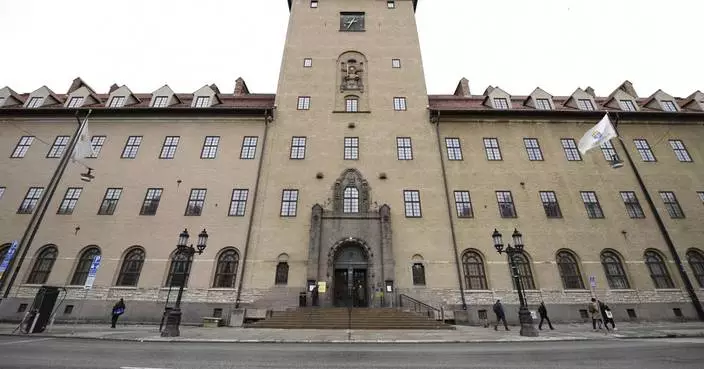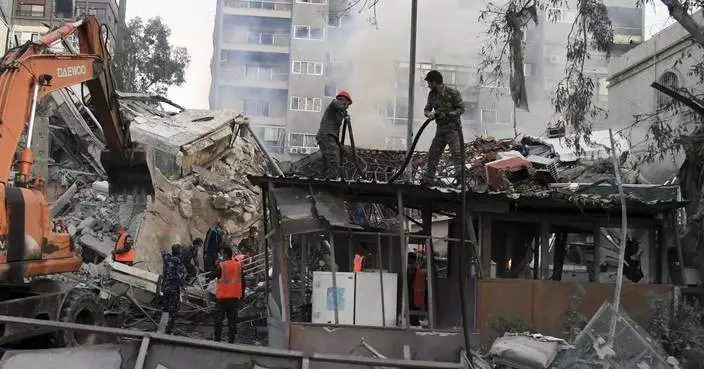President Donald Trump on Saturday declared "Mission Accomplished" for a U.S.-led allied missile attack on Syria's chemical weapons program, but the Pentagon said the pummeling of three chemical-related facilities left enough others intact to enable the Assad government to use banned weapons against civilians if it chooses.

Britain's Prime Minister Theresa May gestures during a press conference in 10 Downing Street, London, Saturday, April 14, 2018. British Prime Minister Theresa May says the need to act quickly and protect “operational security” led her to strike Syria without a prior vote in Parliament. (Simon Dawson/Pool Photo via AP)
"A perfectly executed strike," Trump tweeted after U.S., French and British warplanes and ships launched more than 100 missiles nearly unopposed by Syrian air defenses. "Could not have had a better result. Mission Accomplished!"
His choice of words recalled a similar claim associated with President George W. Bush following the U.S.-led invasion of Iraq. Bush addressed sailors aboard a Navy ship in May 2003 alongside a "Mission Accomplished" banner, just weeks before it became apparent that Iraqis had organized an insurgency that tied down U.S. forces for years.
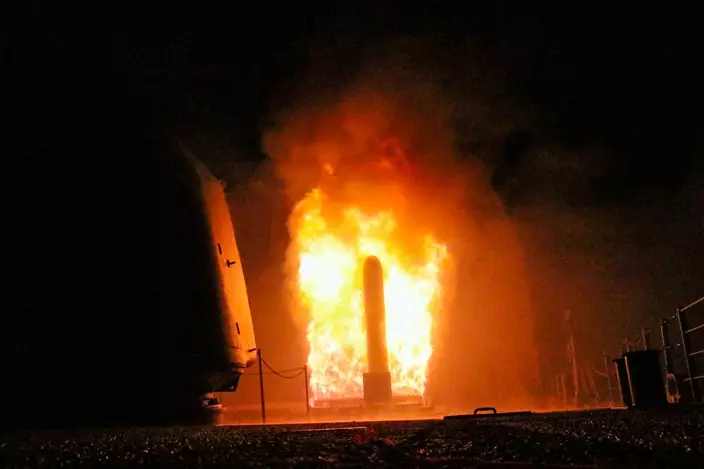
In this image provided by the U.S. Navy, the guided-missile cruiser USS Monterey (CG 61) fires a Tomahawk land attack missile early Saturday, April 14, 2018, as part of the military response to Syria's use of chemical weapons on April 7. The United States, France and Britain launched military strikes in Syria to punish President Bashar Assad for an apparent chemical attack against civilians and to deter him from doing it again. (Lt. j.g. Matthew Daniels/U.S. Navy via AP)
The nighttime Syria assault was carefully limited to minimize civilian casualties and avoid direct conflict with Syria's key ally, Russia, but confusion arose over the extent to which Washington warned Moscow in advance. The Pentagon said it gave no explicit warning. The U.S. ambassador in Moscow, John Huntsman, said in a video, "Before we took action, the United States communicated with" Russia to "reduce the danger of any Russian or civilian casualties."

Pentagon chief spokesperson Dana W. White speaks during a media availability at the Pentagon, Saturday, April 14, 2018, in Washington. (AP Photo/Alex Brandon)
Dana W. White, the chief Pentagon spokeswoman, said that to her knowledge no one in the Defense Department communicated with Moscow in advance, other than the acknowledged use of a military-to-military hotline that has routinely helped minimize the risk of U.S.-Russian collisions or confrontations in Syrian airspace. Officials said this did not include giving Russian advance notice of where or when allied airstrikes would happen.
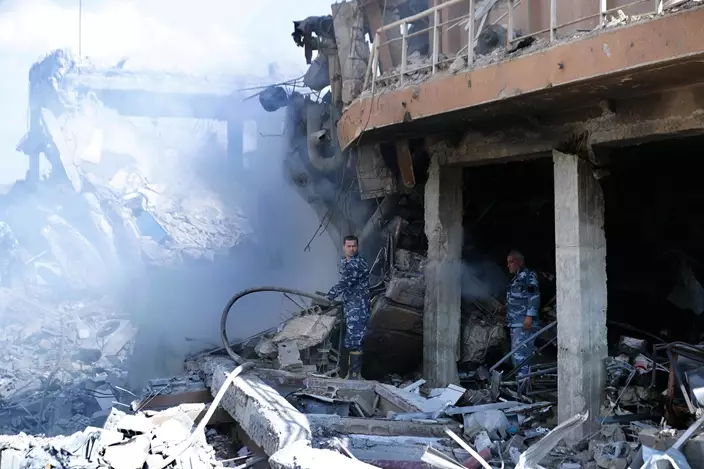
Firefighrers extinguish smoke that rises from the damage of the Syrian Scientific Research Center which was attacked by U.S., British and French military strikes to punish President Bashar Assad for suspected chemical attack against civilians, in Barzeh, near Damascus, Syria, Saturday, April 14, 2018. (AP Photo/Hassan Ammar)
Russia has military forces, including air defenses, in several areas of Syria to support President Bashar Assad in his long war against anti-government rebels.
Russia and Iran called the use of force by the United States and its allies a "military crime" and "act of aggression." The U.N. Security Council met to debate the strikes, but rejected a Russian resolution calling for condemnation of the "aggression" by the three Western allies.
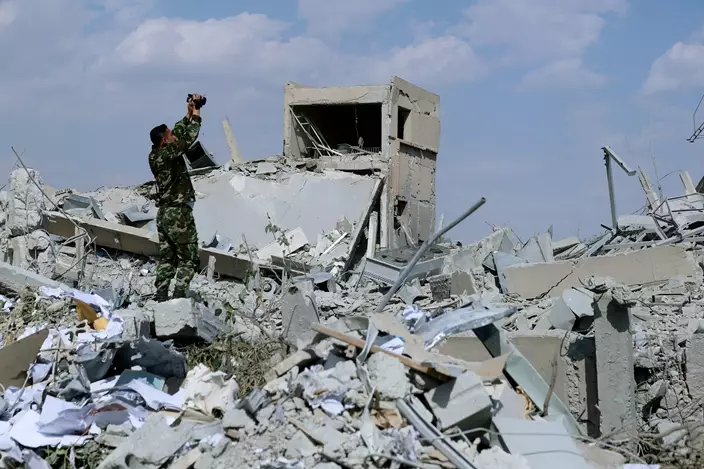
A Syrian soldier films the damage of the Syrian Scientific Research Center which was attacked by U.S., British and French military strikes to punish President Bashar Assad for suspected chemical attack against civilians, in Barzeh, near Damascus, Syria, Saturday, April 14, 2018. (AP Photo/Hassan Ammar)
Trump's U.N. ambassador, Nikki Haley, told the session that the president has made it clear that if Assad uses poison gas again, "the United States is locked and loaded."
Assad denies he has used chemical weapons, and the Trump administration has yet to present hard evidence of what it says precipitated the allied missiles attack: a chlorine gas attack on civilians in Douma on April 7. The U.S. says it suspects that sarin gas also was used.
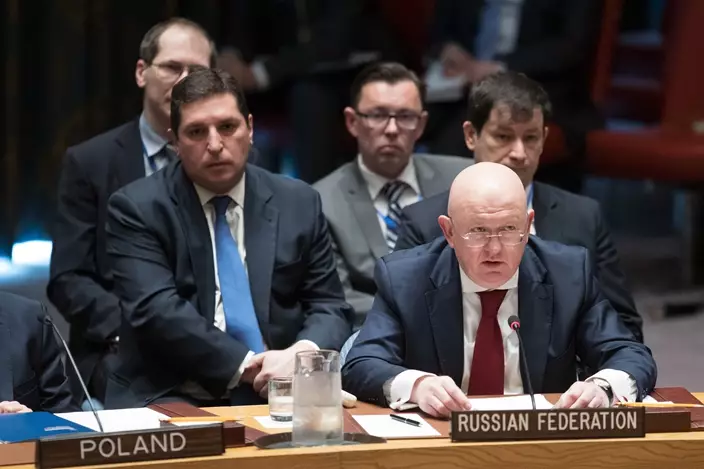
Russian Ambassador to the United Nations Vassily Nebenzia speaks during a Security Council meeting on the situation in Syria, Saturday, April 14, 2018 at United Nations headquarters. (AP Photo/Mary Altaffer)
"Good souls will not be humiliated," Assad tweeted, while hundreds of Syrians gathered in Damascus, the capital, where they flashed victory signs and waved flags in scenes of defiance after the early morning barrage.
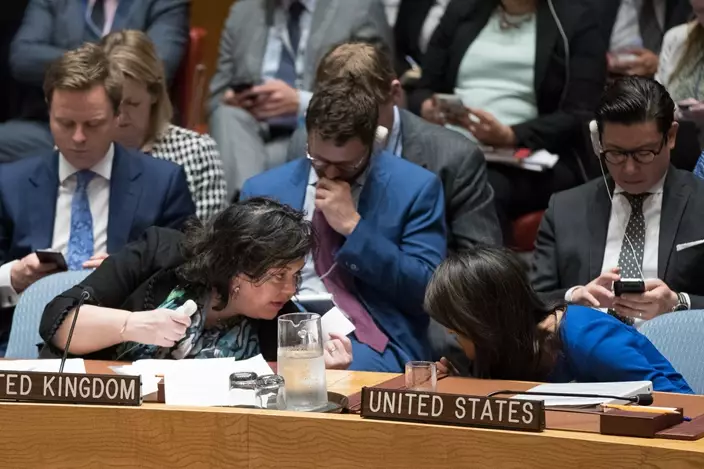
British Ambassador to the United Nations Karen Pierce, left and U.S. Ambassador to the United Nations Nikki Haley share a note during a Security Council meeting on the situation in Syria, Saturday, April 14, 2018 at United Nations headquarters. (AP Photo/Mary Altaffer)
The strikes "successfully hit every target," White told reporters at the Pentagon. The military said there were three targets: the Barzah chemical weapons research and development site in the Damascus area, a chemical weapons storage facility near Homs and a chemical weapons "bunker" a few miles from the second target.
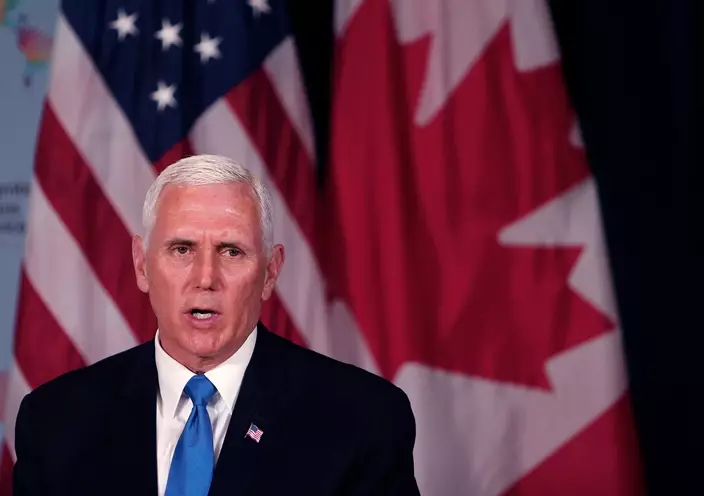
U.S. Vice President Mike Pence speaks during a bilateral meeting with Canada's Prime Minister Justin Trudeau, at the Summit of the Americas in Lima, Peru, Saturday, April 14, 2018. (AP Photo/Karel Navarro)
Although officials said the singular target was Assad's chemical weapons capability, his air force, including helicopters he allegedly has used to drop chemical weapons on civilians, were spared. In a U.S. military action a year ago in response to a sarin gas attack, the Pentagon said missiles took out nearly 20 percent of the Syrian air force.
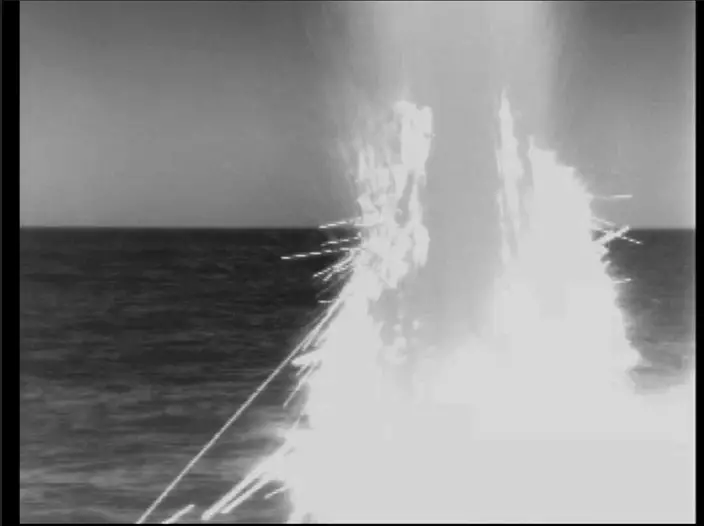
CORRECTS YEAR TO 2018 FROM 2014 - In this image from video provided by the U.S. Navy, a U.S. fast-attack submarine launches a tomahawk missile on April 14, 2018, from the Mediterranean Sea as part of a U.S.-led military operation in retaliation for Syria using chemical weapons on April 7. (U.S. Navy via AP)
As of Saturday, neither Syria nor its Russian or Iranian allies retaliated, Pentagon officials said.
The U.S.-led operation won broad Western support. The NATO alliance gave its full backing; NATO Secretary-General Jens Stoltenberg said in Brussels that the attack was about ensuring that chemical weapons cannot be used with impunity.

This image provided by the Department of Defense was presented as part of a briefing slide at the Pentagon briefing on Saturday, April 14, 2018, and shows a photo of a preliminary damage assessment from the Him Shinshar Chemical Weapons Bunker in Syria that was struck by missiles from the U.S.-led coalition in response to Syria's use of chemical weapons on April 7. (Department of Defense via AP)
German Chancellor Angela Merkel called the attack "necessary and appropriate."
In his televised address from the White House on Friday evening, Trump said the U.S. was prepared to sustain economic, diplomatic and military pressure on Assad until the Syrian leader ends what Trump called a criminal pattern of killing his own people with internationally banned chemical weapons. That did not mean military strikes would continue. In fact, Gen. Joseph Dunford, chairman of the Joint Chiefs of Staff, said no additional attacks were planned.
Asked about Trump's "Mission Accomplished" assertion, White said it pointed to the successful targeting of three Syrian chemical weapons sites. What happens next, she said, is up to Assad and to his Russian and Iranian allies.
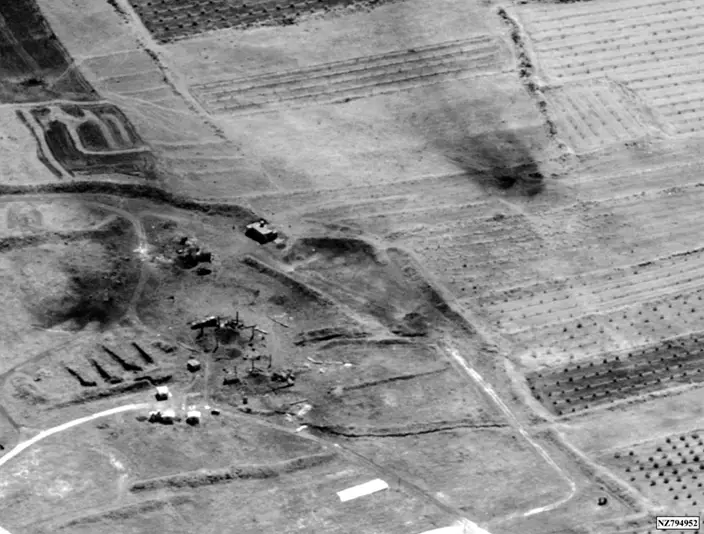
This image provided by the Department of Defense was presented as part of a briefing slide at the Pentagon briefing on Saturday, April 14, 2018, and shows a photo of a preliminary damage assessment from the Him Shinshar Chemical Weapons Storage Site in Syria that was struck by missiles from the U.S.-led coalition in response to Syria's use of chemical weapons on April 7. (Department of Defense via AP)
Marine Lt. Gen. Kenneth F. McKenzie, director of the Joint Staff at the Pentagon, said the allied airstrikes "took out the heart" of Assad's chemical weapons arsenal. He said the missiles hit the "sweet spot," doing the expected level of damage while minimizing the unintentional release of toxic fumes that could be harmful to nearby civilians.
When pressed, he acknowledged that some unspecified portion of Assad's chemical arms infrastructure was not targeted.
"There is still a residual element of the Syrian program that is out there," McKenzie said, adding, "I'm not going to say they're going to be unable to continue to conduct a chemical attack in the future. I suspect, however they'll think long and hard about it."
Assad's Barzah research and development center in Damascus was destroyed, McKenzie said. "It does not exist anymore."
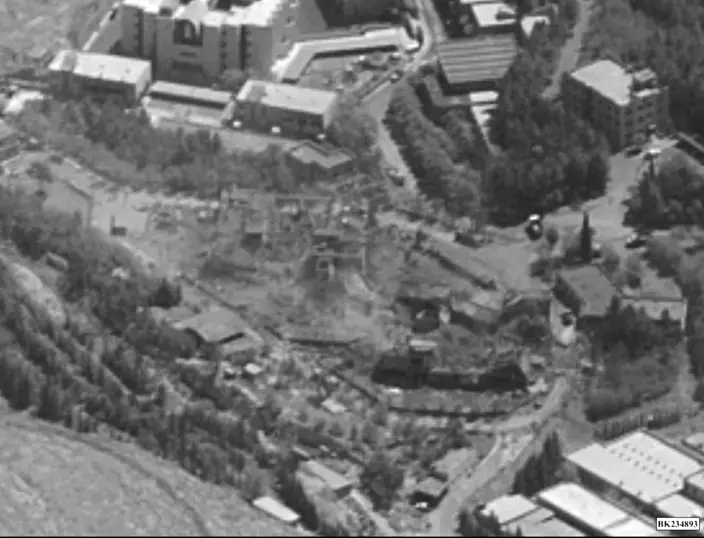
This image provided by the Department of Defense was presented as part of a briefing slide at the Pentagon briefing on Saturday, April 14, 2018, and shows a photo of a preliminary damage assessment from the Barzah Research and Development Center in Syria that was struck by missiles from the U.S.-led coalition in response to Syria's use of chemical weapons on April 7. (Department of Defense via AP)
A former officer in Syria's chemical program, Adulsalam Abdulrazek, said Saturday the joint U.S., British, and French strikes hit "parts of but not the heart" of the program. He said the strikes were unlikely to curb the government's ability to produce or launch new attacks. Speaking from rebel-held northern Syria, Abdulrazek told The Associated Press there were perhaps 50 warehouses in Syria that stored chemical weapons before the program was dismantled in 2013.
Vice President Mike Pence, in Peru for a meeting of regional leaders, said "there will be a price to pay" involving military force if Syrian chemical weapons are used again.
Disputing the Russian military's contention that Syrian air defense units downed 71 allied missiles, McKenzie said no U.S. or allies missiles were stopped. He said Syria's air defenses were ineffective and that many of the more than 40 surface-to-air missiles fired by the Syrians were launched after the allied attack was over. He said the U.S. knew of no civilians killed by allied missiles.
McKenzie said 105 U.S. and allied missiles were fired, of which 66 were Tomahawk cruise missiles launched from aboard three U.S. Navy ships and one Navy submarine. U.S., British and French attack aircraft, including two U.S. Air Force B-1B strategic bombers, launched stealthy, long-range missiles from outside Syrian airspace, officials said.
A global chemical warfare watchdog group, the Organization for the Prohibition of Chemical Weapons, said its fact-finding mission would go as planned in Douma.
Russian leader Vladimir Putin reaffirmed the Kremlin's skepticism about the allies' Douma claim, saying Russian military experts had found no trace of the attack. He criticized the U.S. and its allies for launching the strike without waiting for international inspectors to complete their visit to the area.
But British Prime Minister Theresa May said there was little doubt the Syrian government used a barrel bomb — large containers packed with fuel, explosives and scraps of metal — to deliver the chemicals at Douma. "No other group" could have carried out that attack, May said, adding that the allies' use of force was "right and legal."



